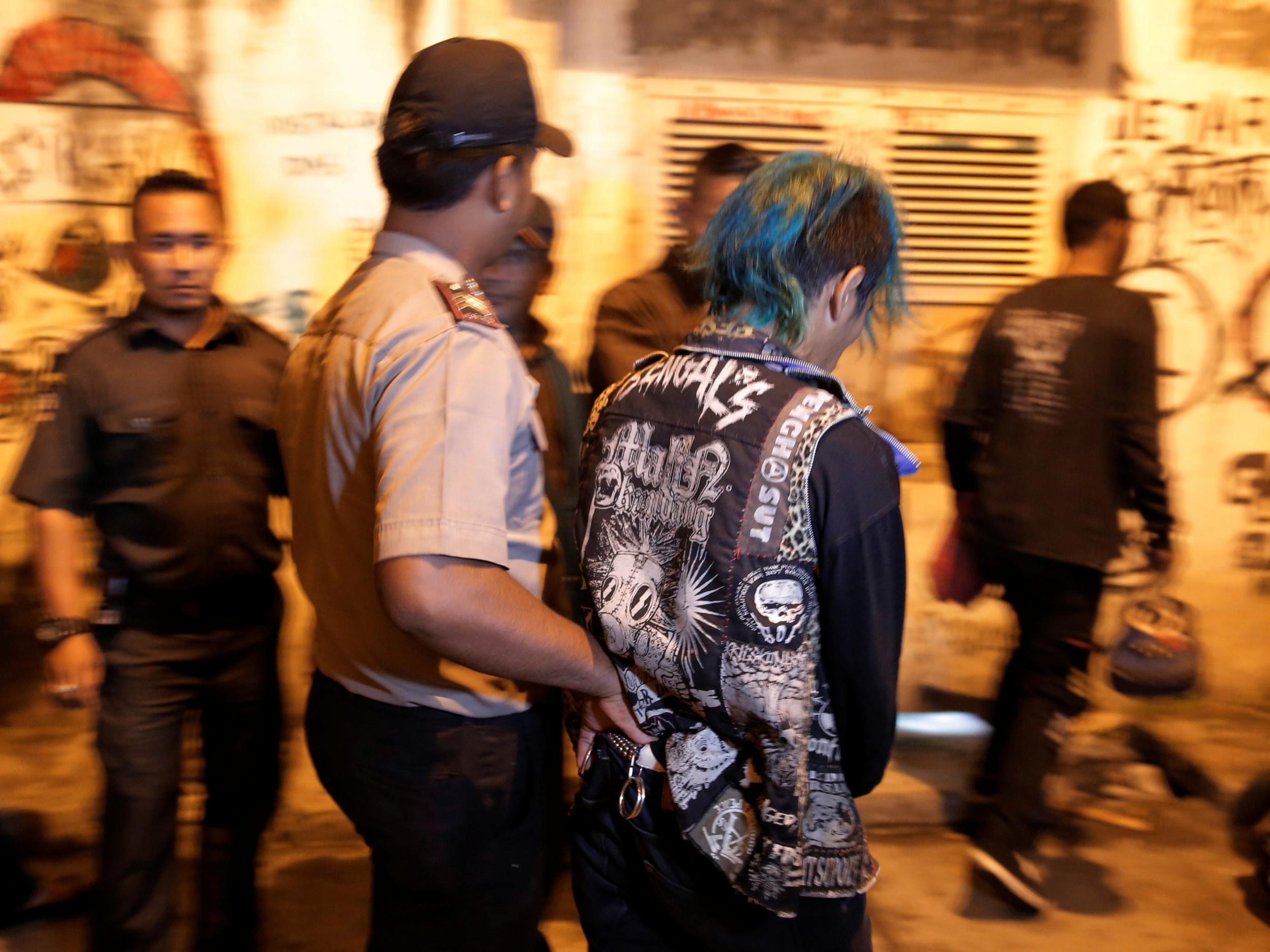Indonesian province sets up anti-LGBT taskforce after gay men caned for having sex
Police chief threatens 'heavy sanctions' for gay men and lesbians

Indonesian police have set up a new task force to investigate activities by gay men and women in the country's most populous province, amid outrage over the caning of two men.
West Java police chief Anton Charliyan said the unit includes police, army and provincial officials, and will monitor and search for locations used for parties by LGBT people.
He told reporters in Bandung that gay people suffered a “disease of the body and soul” and “will not be accepted in society”.
“I hope there are no followers in West Java, no gay or LGBT lifestyle or tradition," Mr Charliyan said. ”If there's anyone following it, they will face the law and heavy social sanctions."
His announcement on Wednesday came after two gay men were publicly caned in front of baying crowds wh called on enforcers to “hit them harder” as punishment for having sex.
The couple, in their 20s, were sentenced to 85 lashes each by a Sharia court in Aceh province after being filmed by local vigilantes.
The brutal sentence – the first of its kind – was carried out in front of a mosque in the city of Banda Aceh in front of a 2,000-strong crowd.
“Cane him on the ass so it won’t happen again!” onlookers shouted, according to Vice News. “Hit him harder!”
The crowd reportedly cheered with each strike of the cane on their backs by five hooded executioners who swapped to prevent tiring.
One man managed to stand until the end of the ordeal, which human rights groups say amounts to torture, while the second broke down.
They were each given 83 strokes – two short of the sentence – as after a remission for time already spent in prison.
Four heterosexual couples had been lashed first to cheers under lesser sentences for violating Islamic laws forbidding contact between unmarried couples.
Many in the crush of spectators filmed the caning with mobile phones, months after footage of the men naked in a rented room was used as evidence to convict them.
Sarojini Mutia Irfan, a female university student who witnessed the caning, said it was a necessary deterrent.
“What they have done is like a virus that can harm people's morale,” she said. “This kind of public punishment is an attempt to stop the spread of the virus to other communities in Aceh.”
Members of the Islamic Defenders Front, a hard-line group known for vigilante attacks on shops, bars, nightclubs, non-Muslims, secular campaigners and LGBT activists.
They erected a banner at the mosque that declared the group was ready to “defend” Sharia law, whatever the cost.
The men were arrested in March after local Banda Aceh broke into their rented room to catch them having sex, taking video that showed the men naked and begging to be freed.
Human Rights Watch had said the caning was torture under international law and had called on Indonesian President Joko “Jokowi” Widodo to intervene.
“The court's less-than-maximum sentence of 85 lashes is no act of compassion. It does not change the reality that flogging is a grotesque display of medieval torture,” said Phelim Kine, the group’s deputy Asia director.
Aceh’s Shariah code allows up to 100 lashes for “morality” offences including adultery, gambling, drinking alcohol, women who wear tight clothes and men who skip Friday prayers.
It is the only province in Indonesia to practice Sharia laws brought in two years ago as a concession made by the national government in 2006, aiming to end a war with separatists.
LGBT+ rights around the globe
Show all 9Reforms allow members of the public as well as the special Sharia police to publicly identify and detain anyone suspected of violating its rules, which specifically outlaw liwath (sodomy) and musahabah (lesbian sex).
They have seen several LGBT suspects detained, including two teenage girls arrested in 2015 on suspicion of being lesbians after embracing in public, as the state parliament has gradually adopted hardline laws to criminalise women who do not wear headscarves, drinking alcohol, gambling, and extramarital sex.
Homosexuality is not illegal elsewhere in Indonesia but a case before the country's Constitutional Court is seeking to criminalise consensual same-sex relations and sex outside marriage.
On Monday, 141 men were detained in a police raid on a gay sauna in Jakarta, with several filmed and photographed by police in what campaigners said was deliberate public shaming.
It came weeks after police in Surabaya, Indonesia's second-largest city, arrested 14 men at what they alleged was a sex party and forced them to have HIV tests.
Indonesia's reputation for tolerance is already under scrutiny after the governor of Jakarta, a Christian, was sentenced to two years in prison for alleged blasphemy.
There are growing fears that Islamists including the Islamic Defenders Front are in the ascendancy in a country home to sizeable communities of Hindus, Christians, Buddhists and other minorities.
As well as home-grown groups, Indonesia is among the Asian nations targeted for expansion by Isis, which launched an attack in Jakarta in January 2016.
Additional reporting by agencies
Subscribe to Independent Premium to bookmark this article
Want to bookmark your favourite articles and stories to read or reference later? Start your Independent Premium subscription today.

Join our commenting forum
Join thought-provoking conversations, follow other Independent readers and see their replies